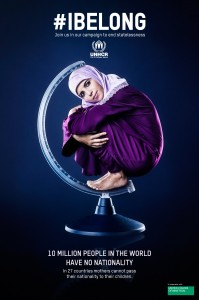This month, UNHCR and the United Colors of Benetton launched the #ibelong campaign in the hopes of giving a face and a voice to statelessness. A ‘stateless person’ is defined by UNHCR as “someone who, under national laws, does not enjoy citizenship – the legal bond between a state and an individual – with any country.”
The right to a nationality is enumerated in Article 15 of the Universal Declaration of Human Rights and two UN conventions, the Convention Relating to the Status of Stateless Persons of 1954 (23 signatories, 81 states parties to date) and the Convention on the Reduction of Statelessness of 1961 (5 signatories, 61 states parties to date). The latter convention of 1961 required signatories to grant citizenship rights to children born in their territories or born to their nationals when in another country.
Because so few states are parties to the Conventions, some ten million people remain stateless in 2014.
Many, but not all, are refugees; the most famous of these, Mehran Karimi Nasseri, became stranded in Terminal 1 of Paris’ Charles de Gaulle Airport following his expulsion from Iran in 1977 for protests against the Shah, and was the inspiration for Steven Spielberg’s film “The Terminal.” Others are ‘undesirables’ or former citizens of now-defunct nations who failed to secure new citizenship after their homelands ‘broke up.’ Many Kurds, for instance, became stateless as a result of the Iraq War.
Worse still, many stateless persons are victims of their ancestry. Because citizenship is generally inherited from one’s parents (and sometimes only from one’s male parent), the children of the stateless suffer the same fate as their parents unless a state has the compassion to take them in.
Stateless persons enjoy none of the rights and privileges that many of us take for granted. Because they have no identification, transnational travel rights for the stateless are effectively restricted. Rights to education, medical care, and employment are likewise all but nonexistent.
With only antiquated safeguards that have not yet fully crystallized into custom, the plight of the stateless remains unanswered. Without the support of states or the codification of new law, the status quo will remain unchanged.
What more must be done to bring the issue of statelessness to the attention of the world community? Share your thoughts in the comments below.
Related Readings:
Nicholas Keung, UN launches #IBELONG campaign to end statelessness, Toronto Star (November 4, 2014), available at http://www.thestar.com/news/immigration/2014/11/04/un_launches_ibelong_campaign_to_end_statelessness.html
UN High Commissioner for Refugees (UNHCR), The World’s Stateless People. Questions & Answers, September 2007, UNHCR / MRPI / Q&A A4 / ENG 1, available at http://www.refworld.org/docid/47a707900.html [accessed 16 November 2014]
Universal Declaration of Human Rights, art. 15, G.A. Res. 217A, at 71, U.N. GAOR, 3d Sess., 1st plen. Mtg., U.N. Doc A/810 (Dec. 12, 1948), available at http://www.un.org/en/documents/udhr/index.shtml#a15
Convention relating to the Status of Stateless Persons, 1954, 360 U.N.T.S., No. 5158, 117, available at https://treaties.un.org/doc/Publication/UNTS/Volume%20360/v360.pdf.
Convention on the Reduction of Statelessness, Aug. 30, 1961, 989 U.N.T.S. 175, available at http://www.refworld.org/docid/3ae6b39620.html.
Stewart E. Forbes, Note, “Imagine There’s No Country”: Statelessness as Persecution in Light of Haile II, 61 Buff. L. Rev. 699, 703 (2013), available at http://www.buffalolawreview.org/past_issues/61_3/Forbes.pdf.
Matthew Rose, Waiting for Spielberg, The New York Times (Sept. 21, 2003), available at http://www.nytimes.com/2003/09/21/magazine/magazinespecial/MFMERHANT.html?pagewanted=1&ei=5007&en=360b6f8f63635c6a&ex=1379476800
Photo courtesy of UNHCR and The United Colors of Benetton’s #ibelong Campaign. Please see http://www.benettongroup.com/archive/press-release/united-colors-benetton-develops-ibelong-campaign for more information.

In an ideal world, everyone should have the right to citizenship, a sense of belonging and protection by a state. Unfortunately, mostly due to war and external displacement of refugees, this is something that will most likely never be achieved. Each state has its reason for not granting citizenship to those that are stateless, mainly so they do not upset their own status quo. For example, the international community as a whole needs to start taking in more Iraqis and Syrians and granting them political asylum. The Middle Eastern countries (especially Lebanon and Jordan) are at maximum capacity for housing refugees. It inhibits the countries from fully functioning — affecting the economic, social and political fragility that already exists. If this were to ever happen, even the most developed countries should take in and grant citizenship to those in need of representation. As much as I would love for this to happen, let’s be real – there is a slight possibility that it will ever happen.